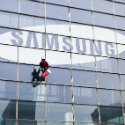The South Korean electronics giant has held up remarkably well in the face of exploding phablets and a bribery scandal.

At most companies, a line-up of exploding products and a bribery scandal engulfing a senior executive would exact a heavy financial toll. But not at Samsung.
The South Korean consumer electronics giant saw its net profit more than double in the final quarter of 2016, to 7.09 trillion Won ($6.1 billion), compared with the year-earlier period. Sales also held up, coming in at KRW53.33 trillion ($45.7 billion) -- the same as in the fourth quarter of 2015.
The profit growth came against the backdrop of a crisis at the company's mobile devices business. Due to design faults, batteries installed in a number of flagship Note 7 "phablets" were reported last year to have caught fire, prompting Samsung Electronics Co. Ltd. (Korea: SEC) to withdraw the product and offer customers refunds or alternative handsets. (See Samsung's NoteGate: Winners & Losers.)
As if that weren't enough, Lee Jae-yong, the vice chairman of the Samsung Corp. conglomerate, has recently stood accused of bribing a friend of Park Geun-hye, South Korea's now disgraced president, who is currently suspended from office following allegations of corruption. (See South Korea Seeks Warrant for Samsung Vice Chairman's Arrest.)
But Samsung has been remarkably resilient in the face of these challenges, thanks largely to sales growth at its memory chip and display panel businesses. Currency movements, which saw the US dollar strengthen against the Korean won, have also worked in the company's favor.
Combined with efficiency measures, those foreign exchange effects seem to have buoyed operating profits despite shrinkage at the IT and mobile communications division, which makes handsets and network equipment and accounts for about 44% of total sales.
For all the latest news from the wireless networking and services sector, check out our dedicated mobile content channel here on Light Reading.
Nevertheless, conditions are likely to be tough this year. Samsung is guiding for a "slowdown" in the smartphone sector and anticipates greater competition in the market for display panels. More optimistically, it is forecasting a "slight increase" in demand for TVs this year, thanks to interest in Ultra HD models as well as emerging-market activity. Its outlook for the chip market is also encouraging, with "stable demand from mobile and servers … expected to continue."
In a statement, Samsung said its mobile priorities would include expanding into the realm of artificial intelligence and adding "high-end" features to devices that are typically categorized in the mid-to-low-end ranges. Such features could include water- and dust-proofing as well as fingerprint recognition, said the company.
On the networks side, Samsung had nothing to say specifically about 5G, or even 4.5G, despite the hype surrounding these technologies. It plans to explore new 4G opportunities in emerging markets this year, and also has an eye on "next-generation IoT [Internet of Things] network business" in more advanced economies.
Market-watchers reckon 2017 will be a big year for IoT services as operators begin to roll out commercial networks based on the NB-IoT standard, which was included in the 3GPP's Release 13 last year. Deployments of Sigfox and LoRa, two wireless technologies that use unlicensed spectrum, are also expected to continue. (See Vodafone Kicks Off NB-IoT Fiesta in Spain.)
— Iain Morris, 

 , News Editor, Light Reading
, News Editor, Light Reading
Read more about:
AsiaAbout the Author(s)
You May Also Like



.jpeg?width=300&auto=webp&quality=80&disable=upscale)







